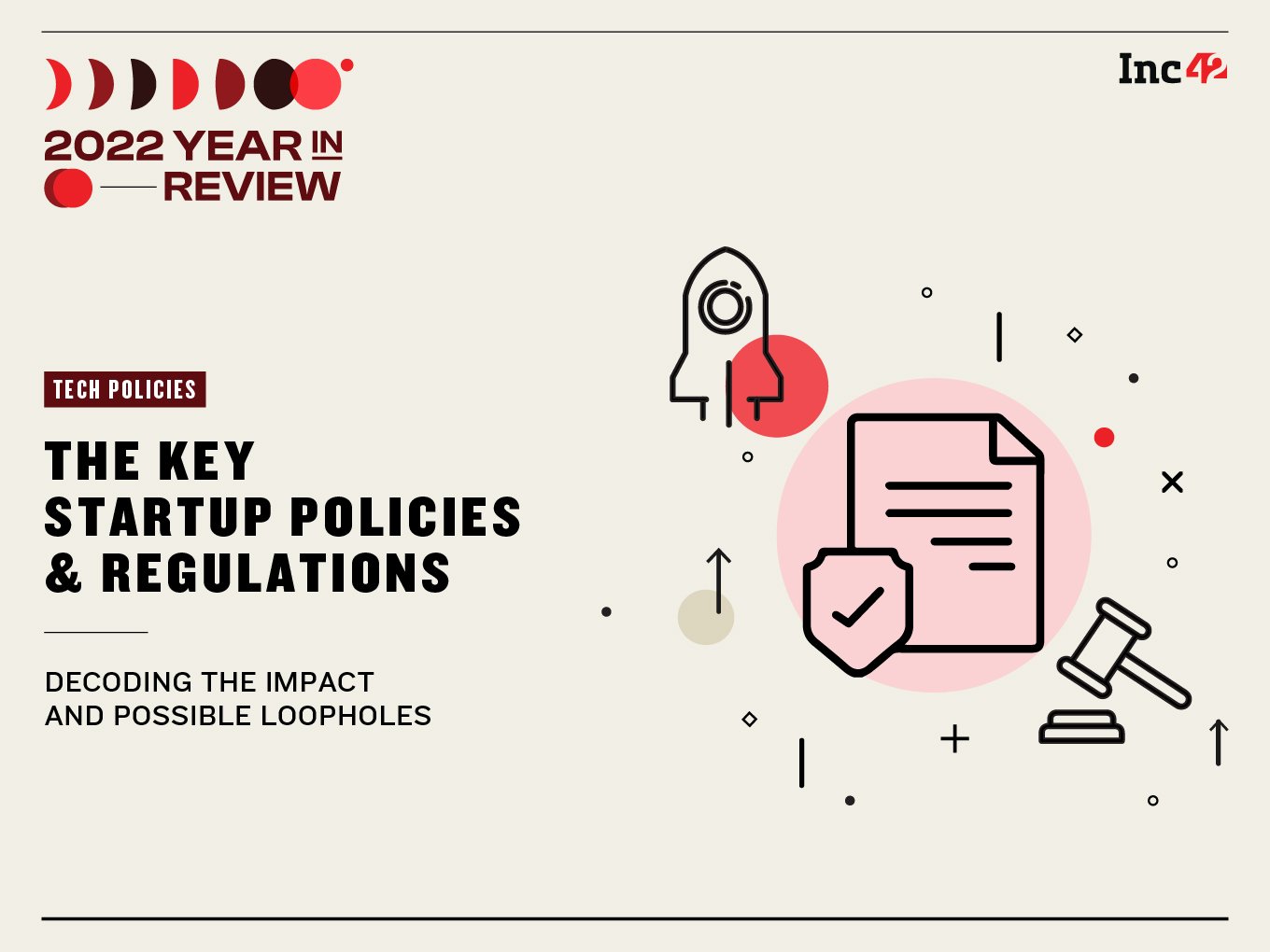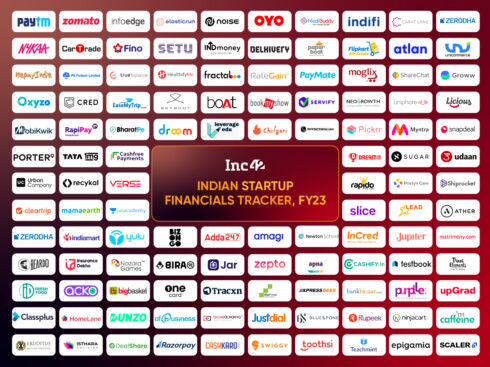SUMMARY
Out of 24,000 startups that sought funding support from the government, only 39 startups received funds under the government’s FSS initiative in 2022
According to industry experts, drafting policies isn’t enough, and the government today needs to walk an extra mile to ensure their positive impact on all stakeholders involved.
2023 is expected to be an enriching year when it comes to extending support to homegrown startups and new-age industries on the back of revamped startup policies and the government’s intention to promote ease of doing business in the country
It looks like the Indian government is in an imaginary race with the country’s startup ecosystem to have greater control over the latter, ignoring the nuances that have led to its growth so far. This can be substantiated with the fact that although the government, along with its statutory bodies, is determined to create regulatory frameworks for the new-age sectors and industries, it has largely failed to address several issues, owing to a lack of clarity, as experts put it.
In this article, we will learn about the impact of the government’s impulsive policies on the country’s startup ecosystem, which today comprises sectors such as ecommerce, crypto, EVs, healthtech, online gaming, and edtech, among others.
However, before we go any further, here are a few examples of India’s abrupt policy decisions that kept many startups and the stakeholders of emerging sectors on their toes in 2022.
In June this year, the Reserve Bank of India (RBI) issued a notification prohibiting the extension of any kind of credit line (loan) through prepaid payment instruments (PPIs) such as cards and digital wallets. The RBI said that such practices, if followed, should be stopped immediately, and any non-compliance in this regard may attract penal action under the provisions of the Payment and Settlement Systems Act, 2007.
As a result, fintech startups Slice, Uni Card, LazyPay, Jupiter, KreditBee and 37 non-bank PPIs had to immediately stop issuing their flagship products. This unexpected arrival of the RBI’s notification impacted these companies in more ways than one, giving further jitters to their already-demotivated stakeholders, including investors.
In the case of Slice, an Indian unicorn, its fundraising plans came to a grinding halt after its investors took a U-turn, seeking more clarity into the RBI’s notification. The unicorn had in June, this year, announced that it was planning to raise $50 Mn from Tiger Global.
Well, this was just one of the many blows that the government’s not-so-thoughtful startup policies gave to homegrown startups.
In another instance, in June this year, the Ministry of Finance decided to impose 1% TDS on all crypto transactions. Due to this, many crypto exchanges operating in the country registered an almost 8x to 10x fall in their daily transaction volumes.
Further, the Karnataka government in October issued an abrupt order to ban Ola, Uber and Rapido just for charging more for auto fare than what was permitted by the state. The order was later quashed by the Karnataka High Court.
During the year, the governments also decided to crack the whip on the online gaming space, which, with its exponential growth, attracted undue regulatory attention in 2022. The fears of a hefty tax regime and stringent regulations kept the stakeholders largely gloomy. The impact of uncertainties, both regulatory and tax-related, was such that fundraising activities in the space nosedived 80% YoY in 2022 from $1.74 Bn in 2021.
While there is no doubt that the number of registered startups has grown from just 400 in 2014 to 85,000 in 2022, the Modi regime still has miles to go in terms of framing startup-friendly policies and defining mechanisms to execute them flawlessly.
Startup India: A Broken Promise
The story of India’s commitment to its startups starts with the government’s Startup India flagship programme, which comprises a slew of startup-oriented initiatives such as Fund of Funds for Startups (FFS), Aspire Fund, and Startup Seed Fund, among others.
Under its Startup India programme, the Indian government extends a series of tax incentives and benefits to registered and eligible startups. However, during the funding winter of 2022, when the Indian startups needed a cushion, its programme failed to do much.
Interestingly, only 39 startups received funds under FFS while the government made a commitment to the tune of INR 1,000 Cr for FFS.
Experts say that the FFS was supposed to mitigate the impact of the funding winter, but it didn’t.
Further, the government’s Aspire Fund (INR 310 CR) and Indian Aspire Fund (INR 2,000 Cr) witnessed no commitments this year.
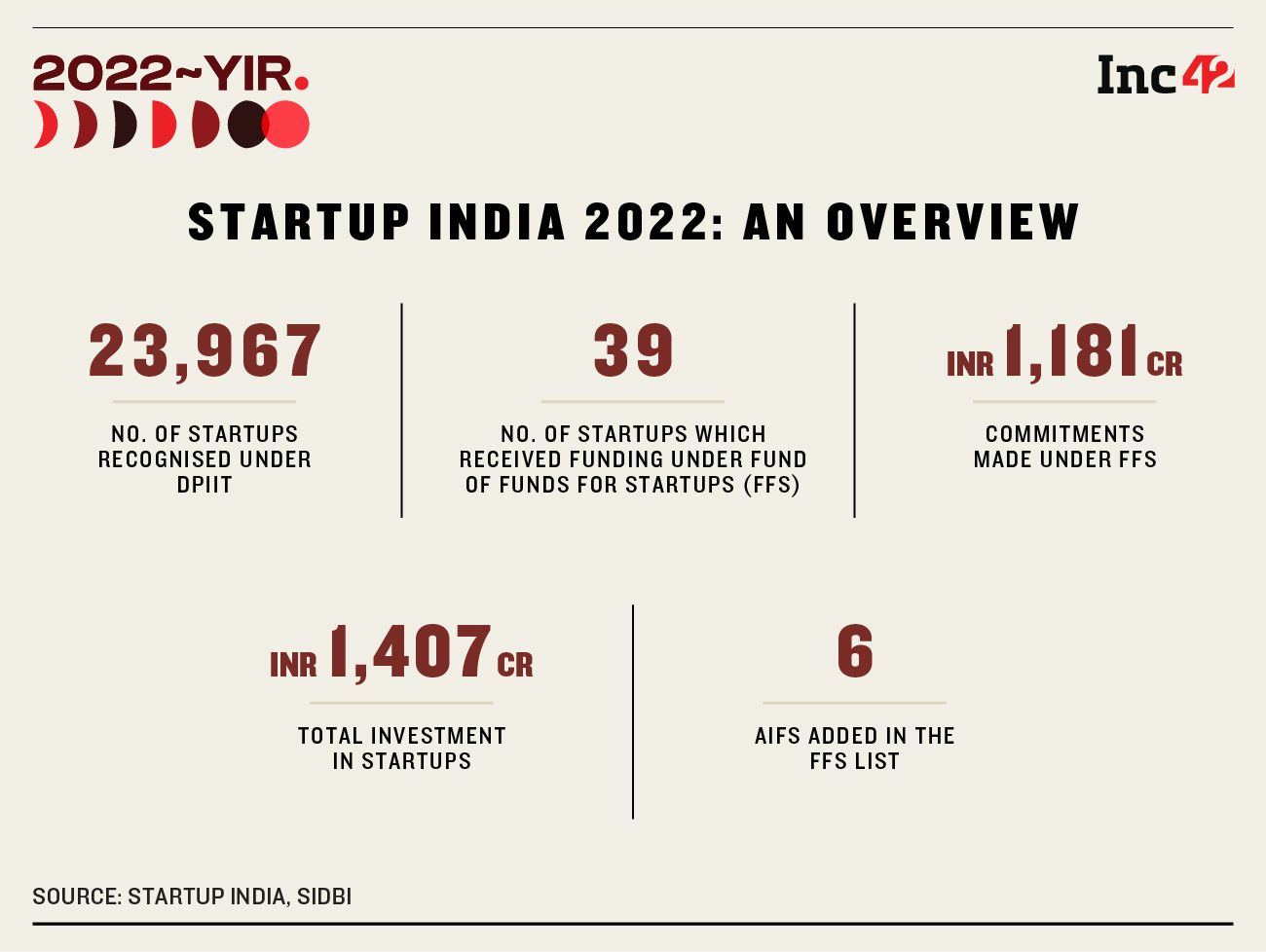
A Hefty Tax Regime Killed The Crypto Goose
In its Finance Act 2022, the Indian government, for the first time, recognised cryptocurrencies as virtual digital assets, just to impose a 30% tax on its profits. Further, what marred the investor confidence was that the government refused to take any cognizance of the losses incurred by crypto investors. This means if you earn INR 10,000 by investing in Bitcoin and incur losses of INR 10,000 via a different crypto route, you will still be paying a 30% tax on the profits earned.
Meanwhile, what bothered the crypto investors more was the 1% TDS on every transaction, which, analysts believe, impacted crypto transactions in India by 8x to 10x. The stakeholders now expect the Indian government to reduce the TDS on crypto from 1% to 0.1-0.4%.
And then, there were Enforcement Directorate’s (ED) probes into as many as 10 crypto exchanges that played a significant role in keeping the Indian crypto ecosystem distant from its growth path.
Subsequently, India’s tough taxation policy on crypto and ED investigations led to the exodus of crypto founders from India. Over 70% of the Indian crypto entities have now moved to Dubai, Singapore, Delaware, and the British Virgin Islands.
After WazirX, ZebPay, Polygon, Coinswitch Kuber and CoinDCX (Primestack Pte) shifted their headquarters outside India, the founders of WazirX – Nischal Shetty and Siddharth Menon – moved to Dubai this year.
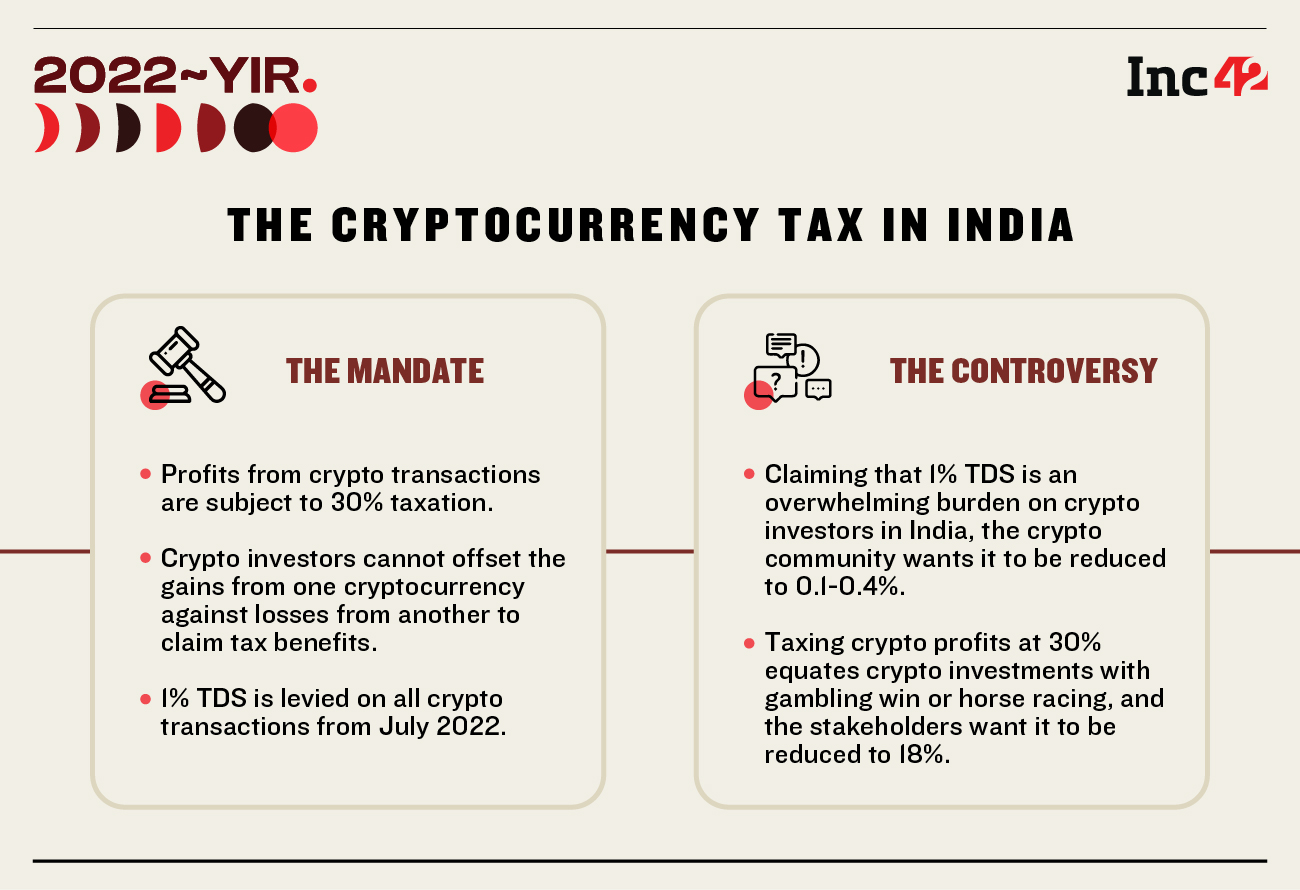
IT Amendment Rules VS. Freedom Of Speech & Expression
In October, the Indian government notified IT Amendment Rules, 2022, under which the Ministry of Electronics and IT (MeitY) introduced an additional layer of censorship, wherein government-appointed committees would decide what stays on the internet, and what doesn’t.
The Indian government cited a need to control the rise of misinformation and fake news. In its draft, the government highlighted that intermediaries (online platforms such as Twitter, Facebook, Youtube, Sharechat, and Koo) have failed to uphold the interests and constitutional rights of netizens, and there was a need to strengthen the grievance redressal framework in the rules. Supporting the government’s stance, MoS IT Rajeev Chandrasekhar said that the new IT Rules are meant to make the web safer.
However, numerous digital media organisations, along with the Internet Freedom Foundation, vehemently opposed the move stating that it will directly curb the freedom of expression online. The rules allow the government to suppress voices that it may not like.

Policy Paralysis And Sectors In Limbo
At a time when several stakeholders are urging the government to have greater clarity in its policies and regulatory frameworks, there are certain sectors that experts believe have been subjected to policy paralysis or pending regulations.
Ecommerce: Even though India’s ecommerce market is set to touch $300 Bn in 2025, the sector is marred by multiple issues related to pending policies and regulatory frameworks. In February 2019, the Modi government released a draft of the National Ecommerce Policy, which was expected to be implemented latest by 2020. However, it’s been more than three years that the policy is still trying to see the light of the day.
Electric Vehicles: Although the Indian government has taken a series of steps to boost the EV sector in India, it has failed to float a wholesome policy to regulate the space and meet the 2030 targets as announced.
According to experts, India doesn’t have a clear roadmap to phase out the use of internal combustion engines (ICEs) and adopt EVs accordingly. Further, the government has been slow in responding to EV fires and issuing comprehensive guidelines to OEMs and users.
Experts believe that promotion can’t alone fill the gap of regulatory policy needs. The EV space needs separate policy and standards to follow, as OEMs adopting their own set of standards will lead to massive eWaste.
Healthtech: The emergence of Covid-19 has raised doubts around the country’s National Health Policy, 2017, which had to ensure improved access and affordability of quality secondary and tertiary healthcare through a combination of public hospitals and strategic purchasing in healthcare deficit areas.
Dr Rohit Sharma, the founder of Zini, a healthcare chatbot, said, “There are four pillars of the healthtech sector: doctors, policymakers, insurers, and patients. Sadly, everybody is in a silo and nobody wants to lose their power.”
He added that policymakers are too scared to upset insurance providers and doctors. “We are witnessing policy paralysis in India’s healthcare space,” he said, adding that the country today needs a National Healthtech Policy that is all inclusive and can help healthtech startups flourish.
Edtech: In 2020, the Modi regime launched the National Education Policy, which underlined a much greater role of edtech startups in mainstream education than just complementary education.
However, in the last few years, there have been multiple issues regarding the functioning of edtech companies and their unfair business practices. In July, the central government issued a warning to edtech companies against unfair business practices. It said that if self-regulation does not work, the government will formulate stringent guidelines.
It’s worth mentioning that in 2022, edtech platforms formed a self-regulatory body under the Internet and Mobile Association of India (IAMAI) called the India EdTech Consortium (IEC).
However, Not All Is Gloomy
In the last couple of years, the Indian government has tried to make its emerging tech policies flexible. As a result, we have seen new markets such as drones, spacetech and data transactions emerge. Drones, once banned, have now become a new market where players such as Swiggy, Zomato, Dunzo, 1mg, and Retailio have partnered with many to pilot drone deliveries. New players are emerging in drone racing as well as drone manufacturing.
Similar is the case with spacetech. In 2018, TeamIndus, India’s first tech startup struggled and failed to send a satellite to the moon as part of Google’s Lunar X Competition. However, in November this year, we saw the successful launch of India’s first privately built Vikram-S rocket by Telangana-based Skyroot. Almost a week later, two other spacetech startups – Pixxel and Dhruva Space – successfully launched their satellites into space (on ISRO’s PSLV C54 mission).
While Inaugurating the Indian National Space Promotion and Authorisation Centre (IN-SPACe) in Bhopal and Ahmedabad in June, PM Modi announced a new Indian space policy for better coordination between government companies, space industries, startups and institutions. The draft policy is expected to be released in 2023.
Further, with the Centre leading from the front, states, too, have been taking multiple steps to lure startups. For instance, Delhi launched its startup policy this year to become a global innovation hub.
In order to address the startup requirements at various stages in the state, a startup task force has been kept at the heart of the policy, which mostly comprises representatives from the industry and academia. Government officials will account for only 5% of the task force, which will be responsible for recognising startups, finalising guidelines for incentives, and monitoring the success of the policy.
Uttar Pradesh, too, has been working on a revised startup policy to encourage women-led and rural-centric ideas. The state has revamped its startup policy to extend incentives and financial grants to startups. Under the new framework, the state has increased the grant of startup seed capital from INR 5 Lakh to INR 7.5 Lakh, while the monthly sustenance allowance for startups has been increased from INR 15K to INR 17.5K.
Telangana has been at the forefront of web3. The state government had earlier set up an Emerging Technology Wing to focus on eight emerging technologies, which include drone, spacetech, blockchain, cloud computing, robotics, 3D printing, VR and AR, IoT, and AI.
Speaking to Inc42, Jayesh Ranjan, chief secretary, Department of IT, Telangana, said that the wing has come a long way with five policy frameworks for AI, drones, spacetech, blockchain, and cloud.
To realise the goals of policy frameworks, it has also set up four technology-dedicated centres of excellence – Telangana AI Mission, National Center of Additive Manufacturing, Cyber Security Center of Excellence, and E-Waste Center of Excellence.
Even the Emerging Technologies Wing of the Government of Telangana has initiated and is working on more than 35 projects centred around the use of the aforementioned emerging technologies for the benefit of the people by partnering with many startups.
These projects have positively impacted various domains like Agriculture, Law Enforcement, Healthcare, Mobility, E-Governance, etc. Some of the Marquee projects that have been ET Wing’s initiatives are Medicine from the Sky, T-Chits, E-Voting, Web 3.0 Regulatory Sandbox and Pest Prediction for cotton crops etc.
Also, the state government launched a Web 3.0 Sandbox this year to promote web3 startups. It has partnered with Coinbase and Devfolio for the execution.
Now, let’s take a closer look at what some of the state governments were up to this year.
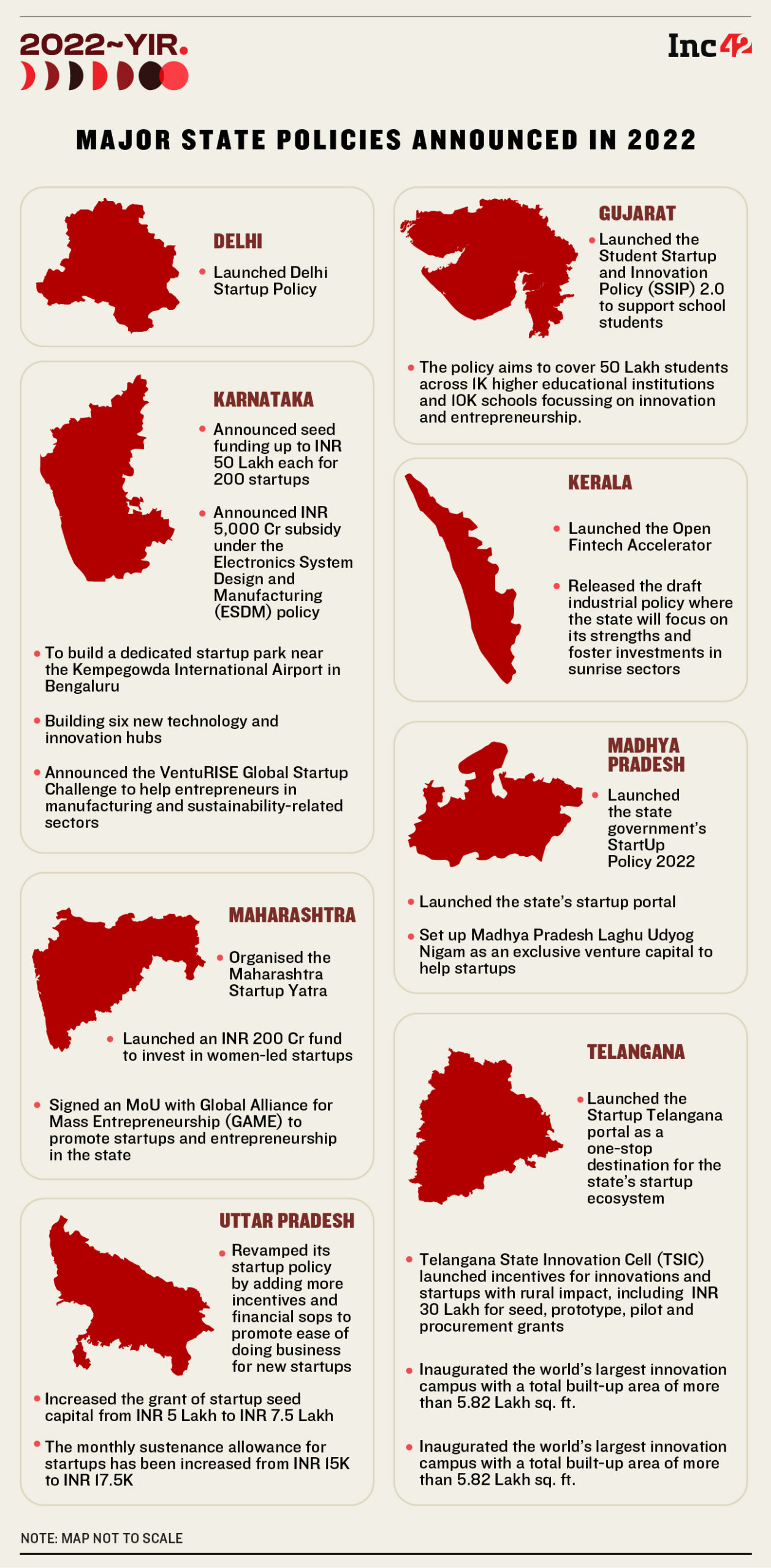
What’s Next?
Drone Policy: Policies take years to shape, especially tech policies. Take drone policies for instance, commercial drones were banned in India until 2017. In December 2017, the Indian government came up with the Unmanned Aircraft Systems Regulations 1.0 and lifted the blanket ban from commercial drones.
In 2021, the Indian government further liberalised drone regulations and moved a step closer to building regulations for drone deliveries. In 2022’s Budget scheme, the finance minister Nirmala Sitharaman announced that startups will be promoted to facilitate ‘Drone Shakti’ through varied applications and for Drone-As-A-Service (DrAAS).
Later, civil aviation minister Jyotiraditya Scindia said that India has the potential to become a global drone hub by 2030 since a large number of industries will adopt drone innovation. Prior to this, he also estimated that the Indian drone industry would have a turnover of around INR 15,000 Cr by 2026. For the drone industry, 2023 will be an interesting year.
Data Protection Policy: In 2022, the Indian government withdrew the Personal Data Protection Bill, 2019, and published a new draft of the Bill – Personal Data Protection Bill, 2022. The Bill is expected to be passed in 2023.
The MeitY has also released the National Data Governance Framework, separating personal data and non-personal anonymised data. The Draft Policy aims to ensure the safe accessibility of these anonymised data from both government and private entities for all research and innovation requirements.
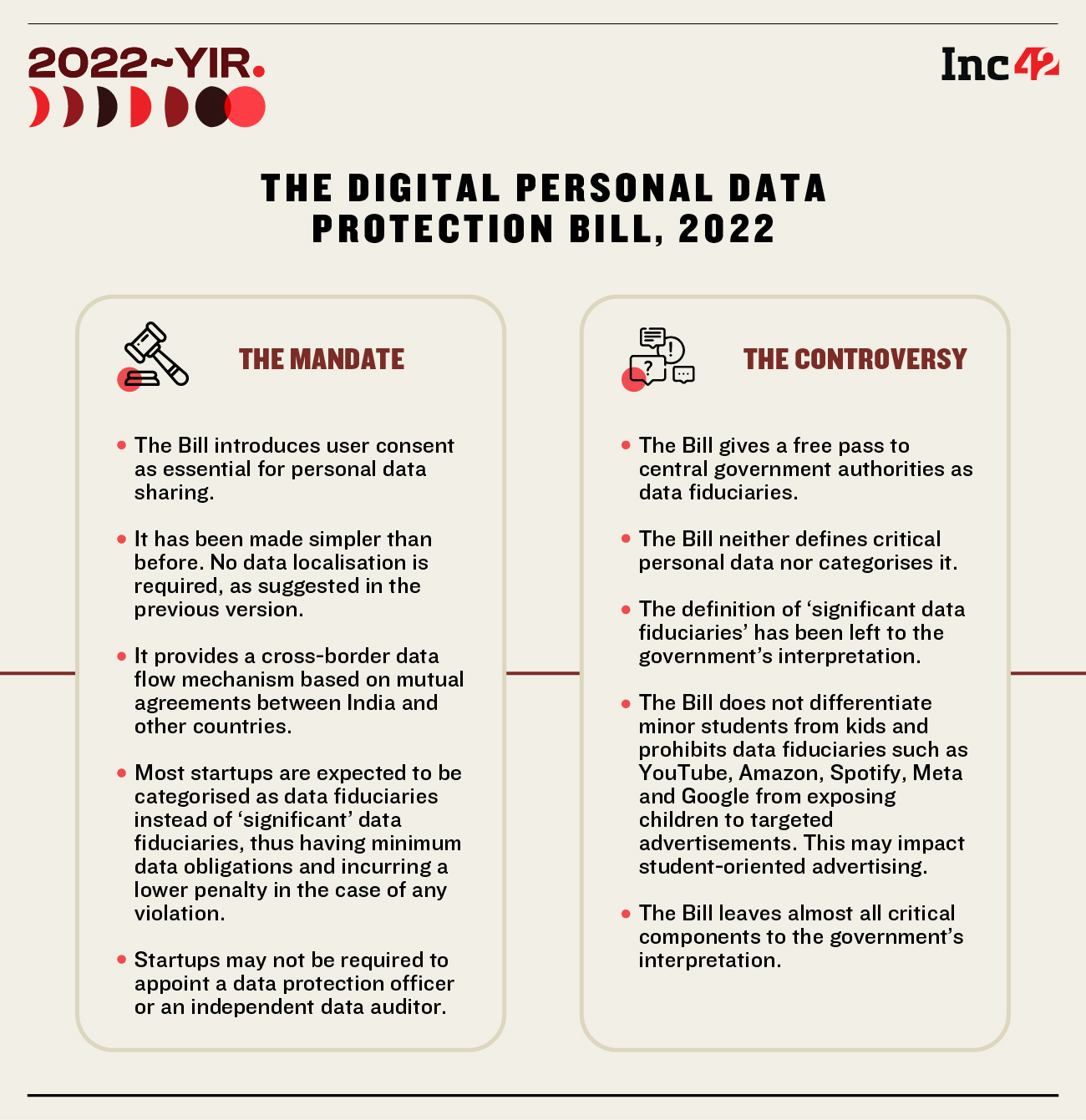
Telecommunication Bill: The Department of Telecommunications has released The Telecommunications Bill to replace the Indian Telegraph Act (1885), the Wireless Telegraphy Act (1933) and the Telegraph Wires (Unlawful Possession) Act (1950). However, what made this Bill controversial is the lack of clarity on multiple accounts and its failure to regulate startups.
The Bill expands the definition of ‘telecommunications services’ to include several new services within Clause 2(21), including:
- Video communication services such as Skype
- Data communication services
- Audiotex services
- Videotex services
- Satellite-based communication services
- Internet-based communication services such as WhatsApp, Gmail, Zoom, and Microsoft Teams
- Interpersonal communications services such as Signal, Telegram, and WhatsApp
- Machine-to-machine communications services such as smart cars, smart TVs, smartwatches, and industrial sensors
- Over-the-top or Internet-based communications services such as Zoom, Facetime, Google Duo, Instagram, and Twitter
This has thus included a whole lot of startups which have been into internet-based communication services. The industry body IAMAI and many other representatives have now written to the DoT to remove startups.
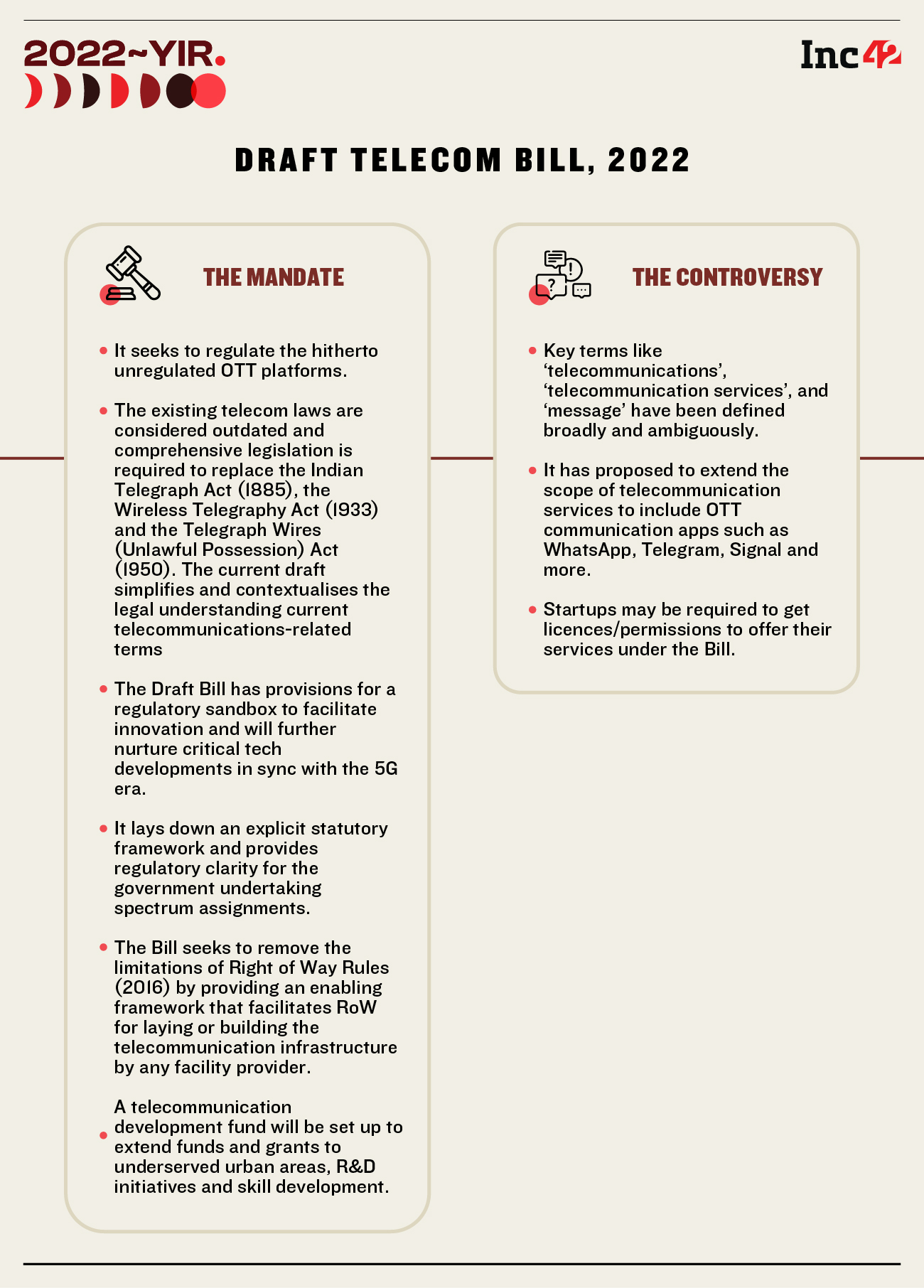
Crypto Bill: One of the most awaited regulations is the Crypto Bill, which has been introduced a couple of times in the Parliament but has not been enacted yet. MoS Chandrasekhar had earlier said that a crypto Bill was not required as the Indian government has already notified tax policies on crypto.
In the winter session of Lok Sabha this year, the Indian government clarified that crypto assets, by definition, are borderless and require international collaboration to prevent regulatory arbitrage. Therefore, any legislation for regulation or for banning can be effective only with significant international collaboration on evaluation of the risks and benefits and evolution of common taxonomy and standards.
National Framework On E-Gaming: Pressing on the regulatory requirement in egaming, MeitY held a meeting with 40 online gaming platforms, including gaming unicorns such as Mobile Premier League (MPL), Dream11, and Nazara Technologies, among others.
The government is expected to release a draft bill in 2023.
Hopes Galore For 2023
Speaking about regulating the startup space, Infosys’ cofounder Kris Gopalakrishnan told Inc42, “We need to rethink how we bring about legislation in the digital space. It’s a space that’s rapidly changing. It’s a space that requires a bit of leeway for experimentation because we don’t understand everything. For instance, the whole area of cryptocurrency was just in the very beginning. So, there are lots of things that we need to think about, and I believe the government will come out with a better Bill.”
Even though the government has been proactive in helping the ecosystem grow, we still see a major challenge when it comes to lawmakers’ understanding of various models. This is quite visible if we look at various drafted/proposed bills. However, one good thing is that the government understands the need to revise them for the greater good of the stakeholders involved.
According to industry experts, drafting policies isn’t enough, and the government today needs to walk the extra mile to ensure a positive impact on all stakeholders involved.
Further, if India wants to reap the benefits of a mature startup economy, it will have to lower taxes and make the documentation process easier to help startups grow and, in return, support the country’s economy
Meanwhile, experts say that 2023 is expected to be an enriching year when it comes to extending support to homegrown startups and new-age industries on the back of revamped startup policies, their refinement, and the government’s intention to promote ease of doing business in the country.
However, when almost every stakeholder of the Indian startup ecosystem is ready to make significant strides, PM Modi’s words like “still miles to go before startups become the backbone of India” (on January 16, the National Startup Day) raise questions on what’s next to come.



